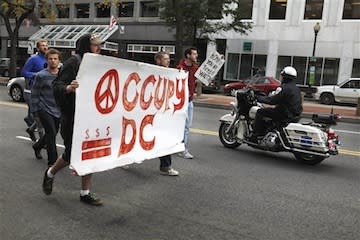 The Ticket
The TicketOccupiers in D.C. regroup after rowdy weekend protest

In the wake of what turned into a rowdy protest outside of a conservative conference over the weekend, tensions were high at Occupy Wall Street's Washington, D.C. encampment on K Street.
Two full days had passed since hundreds of Occupiers demonstrated outside the Walter E. Washington Convention Center Friday night, where members of Americans for Prosperity, a national conservative group, held its annual summit.
As AFP members were eating dinner Friday night, dozens of the demonstrators filled the front steps of the building, blocking the entrance. When police pushed them back and shut the doors, some pounded the glass while others locked arms. Another set of demonstrators huddled in the road on the streets surrounding the convention center. But before the night was over, at least four OWS demonstrators were struck by cars, and one said she was choked by a police officer. Meanwhile, an elderly AFP member tripped and fell hard on the pavement when she tried to exit through the blockade and others were pushed when they tried to exit the building.
The encounter earned a swift rebuke from AFP, an organization that has drawn the ire of liberal groups for its ties to billionaire moguls Charles and David Koch, who fund several conservative and libertarian causes.
"Countless attendees have expressed that they felt intimidated and experienced violence from the OWS protesters," said AFP spokeswoman Jennifer Ridgley. "It is clear OWS protesters were not only violent, but expressed a complete disrespect to their fellow Americans."
The D.C. Metropolitan Police, who for the most part kept their distance at Friday's demonstration, issued a statement Monday concluding that the protest was not "peaceful" and announcing that the department would re-evaluate how it would deal with the protesters who had set up camps for weeks in two parts of the city--on K Street and in Freedom Plaza, at the corner of 14th Street and Pennsylvania Ave, NW.
The Occupiers, however, tell a different story. They blame the police for inciting violence and letting the drivers of the cars that struck some of their fellow protesters go free.
Until this point, members of the Occupy movement in D.C. have been a relatively quiet--at least in comparison with some of the other chapters in major cities throughout the country. They have kept the camps in the District clean and their regular marches through the city have been peaceful. Relations with the local police have, for the most part, been congenial.
But after Friday's protest, there are worries that this could all change. Throughout the day on Monday, police cars and paddy wagons encircled the encampments. Two officers made regular walks through the K Street camp--putting many of the demonstrators on edge as they tried to piece together exactly what happened on Friday. Generally, the OWS demonstrators agreed that they did nothing wrong by blocking the doors. But the action is raising questions among the D.C. protesters about how the group would demonstrate in the future--and whether the police would tolerate the demonstrators the next time they stage a vocal protest.
"We're going to try to find the right balance between disrupting, in terms of our presence versus actions that might restrict other person's rights to assemble," said Jim McBride, a member of the D.C. chapter's communication team. "We want to make sure we protest, but also make sure it's the most peaceful way possible."
On Monday night, the Rev. Jesse Jackson visited the camp to remind the protesters to keep their cool.
"The media would rather focus on the brick than focus on the bank," Jackson told a crowd gathered around him. "Remain nonviolent."
Of the several protesters interviewed on K Street, all seemed in agreement that the demonstration on Friday fell within the group's guidelines for peaceful assemblies--and that their members were not at fault for any injuries caused, including those sustained by the woman who fell on the stairs.
"Shouting at a door is peaceful action," said James Ploeser, a member of the chapter's action committee. "There were lots of exits people could leave from. No one was ever trapped in that building by any stretch of the imagination."
"We're not trying to intimidate people," said Michael Patterson, an Alaska native who now lives at the K Street camp. "We're trying to get a message out. That was our first action that we had to personally attack the establishment." (Patterson later clarified that he did not intend to use the word "attack" to refer to physical violence.) "You want to do violence? Don't be in this park," he went on to say. "The only people who were acting violently are the police and the people who ran us over."
More popular Yahoo! News stories:
Want more of our best political stories? Visit The Ticket or connect with us on Facebook and follow us on Twitter.

